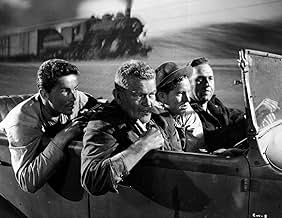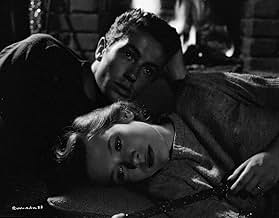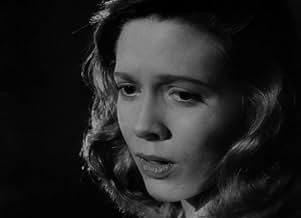IMDb-BEWERTUNG
7,4/10
9959
IHRE BEWERTUNG
Füge eine Handlung in deiner Sprache hinzuAn escaped convict injured during a robbery falls in love with the woman who nurses him back to health, but their relationship seems doomed from the beginning.An escaped convict injured during a robbery falls in love with the woman who nurses him back to health, but their relationship seems doomed from the beginning.An escaped convict injured during a robbery falls in love with the woman who nurses him back to health, but their relationship seems doomed from the beginning.
- Regie
- Drehbuch
- Hauptbesetzung
Empfohlene Bewertungen
This was the first pairing of Farley Granger and Cathy O'Donnell and it was successful enough so that the two worked together two years later in "Side Street. I heard that this movie was sort of a early "Bonnie and Clyde," and it was, but only to a degree.
Granger and O'Donnell didn't really dominate the screen until after 40 minutes but after that, it was mostly them. Frankly, I enjoyed the first 40 minutes best when Howard da Silva and J.C. Flippen shared the screen time. They were great film noir characters in this movie (and they did come back in the second half, livening up the film again.) I liked their names in here: da Silva was "Chicamaw." and Flippen was "T-Dub." In most of the second half of this movie, it went from a noir to a romance. but that's not surprising knowing the director was Nicholas Ray.
This is the best I've ever seen O'Donnell, who never impressed me much but she's impressive here with a fine performance and a nice '40s look to her. She had a strange character name, too: "Keechie." Granger ("Arthur Bowers") does a nice job, too. For an uneducated thug, he sure comes across as a really nice guy. It's kinda of weird. He reminded me of John Dall in "Gun Crazy" (1950). Some of the camera-work also reminded me of "Gun Crazy."
However, one major detail should be noted: unlike "Gun Crazy" and "Bonnie & Clyde," the two lovers in this movie did NOT rob banks together. O'Donnell's character never gets involved in any crime, so comparing this film to those doesn't really fit. Most of "Keechie's" time is spent living in a remote cabin lodge, and suggesting periodically to her husband that he go straight - a far cry from the women Peggy Cummins and Faye Dunaway played.
Like a lot of good film noirs, this also has some very good supporting actors who play weird people, and say weird things. Some of the dialogue in this movie is fascinating because it's so odd. One example is the guy who marries the couple for $20. Another is Keechie's father.
This is a odd little "B" noir/melodrama and definitely one that film noir fans should check out. Romantics will like it, too. I'm glad it is now available on disc, as part of the Film Noir Classics Collection Volume 4.
Granger and O'Donnell didn't really dominate the screen until after 40 minutes but after that, it was mostly them. Frankly, I enjoyed the first 40 minutes best when Howard da Silva and J.C. Flippen shared the screen time. They were great film noir characters in this movie (and they did come back in the second half, livening up the film again.) I liked their names in here: da Silva was "Chicamaw." and Flippen was "T-Dub." In most of the second half of this movie, it went from a noir to a romance. but that's not surprising knowing the director was Nicholas Ray.
This is the best I've ever seen O'Donnell, who never impressed me much but she's impressive here with a fine performance and a nice '40s look to her. She had a strange character name, too: "Keechie." Granger ("Arthur Bowers") does a nice job, too. For an uneducated thug, he sure comes across as a really nice guy. It's kinda of weird. He reminded me of John Dall in "Gun Crazy" (1950). Some of the camera-work also reminded me of "Gun Crazy."
However, one major detail should be noted: unlike "Gun Crazy" and "Bonnie & Clyde," the two lovers in this movie did NOT rob banks together. O'Donnell's character never gets involved in any crime, so comparing this film to those doesn't really fit. Most of "Keechie's" time is spent living in a remote cabin lodge, and suggesting periodically to her husband that he go straight - a far cry from the women Peggy Cummins and Faye Dunaway played.
Like a lot of good film noirs, this also has some very good supporting actors who play weird people, and say weird things. Some of the dialogue in this movie is fascinating because it's so odd. One example is the guy who marries the couple for $20. Another is Keechie's father.
This is a odd little "B" noir/melodrama and definitely one that film noir fans should check out. Romantics will like it, too. I'm glad it is now available on disc, as part of the Film Noir Classics Collection Volume 4.
A beautiful yet bleak movie about doomed young love on the run. The debut directorial feature of Nicholas Ray, it starts with three escaped prisoners on the run, roughing up the driver of a car they've hijacked after robbing a bank, two of them are seasoned old pros, but the third is a fresh-faced youngster imprisoned for a murder committed when he was a teenager. Although grateful for their springing him, he is resistant to their future plans to continue a life of crime. When they turn up at a safe house peopled by an old alcoholic friend and his young daughter, she makes clear her distaste for the three escapees. Tomboyish, with her hair up and dressed in overalls, she softens to the fresh-faced lad as she nurses him through an injury he's picked up on the road.
Soon they fall in love and decide to hit the road themselves, paying $20 dollars for a cut-price marriage but while they dream of carefree days ahead, in truth, they're always looking over their shoulders, fearing his discovery by the authorities, but when he's tracked down by his old cronies and forced into another bank job which goes wrong, his notoriety only increases and you just know his days are numbered.
Central to the film is the chemistry between its young stars Farley Granger and Cathy O'Donnell, as Bowie and Keechy, both completely natural in their roles. Production Code morality of the day ensures that Granger's Bowie character is duly punished for his misdemeanours but all the way you're rooting for the youngsters to somehow come through.
Starkly filmed by Ray, he ramps up the emotional tension as every time the couple find some solace and calm on their travels something happens to set them back. A last-ditch attempt to escape to Mexico only confirms Bowie's hopelessness at his and Keechy's prospects leaving just one final betrayal to seal his fate. Shot in atmospheric black and white with many imaginatively staged scenes alternating tenderness and fear, perhaps the most striking use of Ray's cameras are the helicopter shots looking down on the fleeing characters even as their journeys will take all of them nowhere.
Watching the film, I was reminded of another earlier noir classic about ill-fated young love, Fritz Lang's superb "You Only Live Once". Both are dark, driven, doomy pieces, memorable and highly recommended, just don't look for happy endings. Even the movies don't all end that way.
Soon they fall in love and decide to hit the road themselves, paying $20 dollars for a cut-price marriage but while they dream of carefree days ahead, in truth, they're always looking over their shoulders, fearing his discovery by the authorities, but when he's tracked down by his old cronies and forced into another bank job which goes wrong, his notoriety only increases and you just know his days are numbered.
Central to the film is the chemistry between its young stars Farley Granger and Cathy O'Donnell, as Bowie and Keechy, both completely natural in their roles. Production Code morality of the day ensures that Granger's Bowie character is duly punished for his misdemeanours but all the way you're rooting for the youngsters to somehow come through.
Starkly filmed by Ray, he ramps up the emotional tension as every time the couple find some solace and calm on their travels something happens to set them back. A last-ditch attempt to escape to Mexico only confirms Bowie's hopelessness at his and Keechy's prospects leaving just one final betrayal to seal his fate. Shot in atmospheric black and white with many imaginatively staged scenes alternating tenderness and fear, perhaps the most striking use of Ray's cameras are the helicopter shots looking down on the fleeing characters even as their journeys will take all of them nowhere.
Watching the film, I was reminded of another earlier noir classic about ill-fated young love, Fritz Lang's superb "You Only Live Once". Both are dark, driven, doomy pieces, memorable and highly recommended, just don't look for happy endings. Even the movies don't all end that way.
Nicholas Ray is mostly known for his work, "Rebel WIthout a Cause", but his first work, a dazzling, moving (if sentimental) film noir, is far better. Unjustly out-of-print, "They Live By Night" may have its minor flaws, but the stark, beautiful camerawork, stolid dialogue and (perhaps above all) exquisite performances make up for it. It has none of the often phony emotions and annoying characters that are found in "Rebel Without a Cause."
Bowie, the innocent, sympathetic outlaw hero of "They Live By Night" is a wonderfully drawn. By no means is he the cliched nice-guy-in-a-bad-situation; though essentially good-hearted, he can be frighteningly callous at times. Farley Granger, working with excellent direction, he gives us glimpses of a violent yet passionate nature, struggling against the condemnation of society. Cathy O'Donnell is also entrancingly tender, yet we can vaguely see that her character is trapped in a hopeless relationship with Bowie. She is also sadly obscure, which plainly has nothing to do with her talent.
The one significant fault of this film is over-restraint. At times, Ray's understated direction can be extremely effective, such as when he is dealing with violence. But at other times the characters' (and especially Keechie's) emotions are so tightly controlled that some of the impact on the audience is lost. Still, despite a few faults, "They Live By Night" is a wonderful film, and if ever you can find it, sell your hair but GET IT!!!
Bowie, the innocent, sympathetic outlaw hero of "They Live By Night" is a wonderfully drawn. By no means is he the cliched nice-guy-in-a-bad-situation; though essentially good-hearted, he can be frighteningly callous at times. Farley Granger, working with excellent direction, he gives us glimpses of a violent yet passionate nature, struggling against the condemnation of society. Cathy O'Donnell is also entrancingly tender, yet we can vaguely see that her character is trapped in a hopeless relationship with Bowie. She is also sadly obscure, which plainly has nothing to do with her talent.
The one significant fault of this film is over-restraint. At times, Ray's understated direction can be extremely effective, such as when he is dealing with violence. But at other times the characters' (and especially Keechie's) emotions are so tightly controlled that some of the impact on the audience is lost. Still, despite a few faults, "They Live By Night" is a wonderful film, and if ever you can find it, sell your hair but GET IT!!!
Farley Granger plays Bowie, a young con who escapes from the pen with two hardened criminals, Chicamaw and T-Dub played respectively by Howard Da Silva and Jay C Flippen in They Live By Night, an aptly titled film if there ever was one. Da Silva and Flippen are both terrific here, as is Cathy O'Donnel as Keechie, Bowie's equally young girlfriend. The movie revolves around the relationship between them and their efforts to get away from the life of crime that is always a few steps behind them and also to try living like normal people, during the day, instead of at night, like their criminal associates. This was Nicholas Ray's first film as a director and it certainly was a worthy effort, as it has fine performances throughout, especially O'Donnels. As the film comes to a close, you can pretty well figure out the ending, but that doesn't detract from its potency, as they are let down by one of their own, blackmailed it seems by the cops.
Nicholas Ray's first feature, in 1949, was an adaptation of the novel Thieves Like Us (which Robert Altman so memorably filmed in the mid-1970s). It's a bit of a surprise to encounter the same characters -- Bowie, Keechie, T-Dub et al. -- in postwar black-and-white. Farley Granger and Cathy O'Donnell play the star-crossed lovers later rended by Keith Carradine and Shelly Duvall, and they bring a vulnerable, doomed edge to this very interesting, tragic movie. (Granger may never have been better during his brief bout of stardom). The supporting cast isn't quite up to the level of Altman's (without Louise Fletcher and her odd little girl), but on the whole this remains an honorable and moving piece of film art -- and a vital instalment, along with the same year's Gun Crazy (also a tale of doomed, romantic outlaws), in the noir cycle.
Wusstest du schon
- WissenswertesThe opening helicopter shot was the first scene that Nicholas Ray ever directed.
- PatzerThe new Cadillac is seen to be covered with a tarpaulin. When the camera swings back to it, the tarpaulin has vanished.
- Crazy CreditsOpening credits: This boy . . . and this girl . . . were never properly introduced to the world we live in . . . To tell their story . . .
- VerbindungenEdited into Geschichte(n) des Kinos: Le contrôle de l'univers (1999)
- SoundtracksYour Red Wagon
by Richard M. Jones, Don Raye and Gene de Paul (as Gene DePaul)
Performed by Marie Bryant (uncredited)
[Sung by club performer]
Top-Auswahl
Melde dich zum Bewerten an und greife auf die Watchlist für personalisierte Empfehlungen zu.
- How long is They Live by Night?Powered by Alexa
Details
- Erscheinungsdatum
- Herkunftsland
- Sprache
- Auch bekannt als
- Los amantes de la noche
- Drehorte
- Produktionsfirma
- Weitere beteiligte Unternehmen bei IMDbPro anzeigen
Box Office
- Budget
- 808.397 $ (geschätzt)
- Laufzeit1 Stunde 35 Minuten
- Farbe
- Seitenverhältnis
- 1.37 : 1
Zu dieser Seite beitragen
Bearbeitung vorschlagen oder fehlenden Inhalt hinzufügen

Oberste Lücke
By what name was Sie leben bei Nacht (1948) officially released in India in English?
Antwort





































